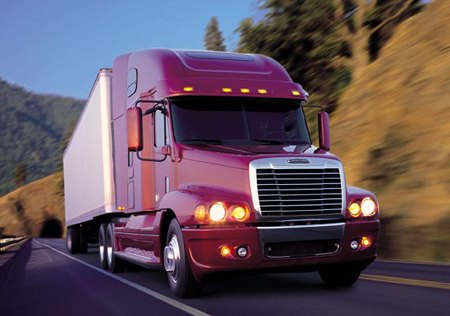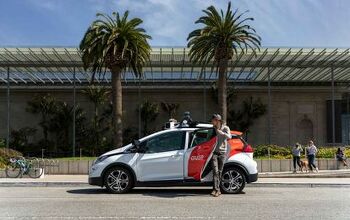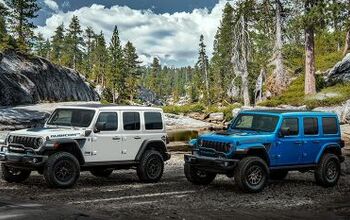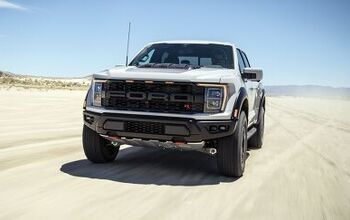The Mitsubishi Freightliner
Mitsubishi Motors is on the ropes. US sales are in the basement. Aside from the new Eclipse and the niche-market EVO, they haven't got a winning product in sight. A line of forgettable sedans and me-too SUVs does not a viable car company make. DaimlerChrysler's decision to pull the plug on future financial aid doesn't bode well either. In fact, Mitsubishi is knocking on the door of bankruptcy. Desperate times call for desperate measures. It's time for them to build a "real" pickup truck: a Mitsubishi Freightliner.
Despite the recent surge in gas prices, the US pickup truck market remains relatively robust. And even if it's contracting slightly, the profits aren't. The average profit on a pickup is $13,000 per unit. No wonder Nissan threw their hat in the ring with the Titan, and Toyota's promising all-new Tundra is due out next spring. Mitsubishi's entry, the Raider, is a badge engineered Dodge Dakota, but not nearly as memorable. It has some of the right stuff, including a V8, but cowers in the darkest corners of the marketplace, ignored and little missed. To make the grade and mint some money, Mitsubishi needs a full-size competitor to the Ford Super Duty.
Despite its connection to DaimlerChrysler, Freightliner isn't doing so well. Demand for their medium and heavy trucks has been soft for some time. Their foray into vans, the re-badged Mercedes Sprinter, is aimed at a narrow market niche– a niche that's even narrower now that there's a Dodge-badged Sprinter. But Freightliner's reputation as a maker of tough trucks is undiminished. Their Century Class trucks set new standards for comfort and luxury in heavy truck cabs. Freightliner's Sterling (formerly Ford) trucks are probably the most efficient and durable medium and heavy trucks on the planet.
Mitsubishi and Freightliner should pool their resources and build a new, heavy-duty, full-size pickup truck, designed to compete head-to-head with Ford's Super Duty. Freightliner has the design and engineering capabilities to create the truck. The Mitsubishi version could be sized and optioned like a Ford F250HD and F350, and the Freightliner version could cover the F350 and F450 range. Make sure it's big enough, has all the truck amenities and a really aggressive front end, and buyers will flock to the showrooms. A real Freightliner for the price of Dodge imitation? Hard to resist.
Freightliner doesn't make engines, and Mitsubishi doesn't have an engine suitable for a large truck. As we've discussed here before, there are plenty of first-rate American parts makers who can feed aspiring automakers suitable components. Freightliner is a major customer of Cummins. The new Mitsubishi Freightliner could run on the same Cummins diesel engine used in the Dodge Ram. Alternatively, Navistar (International) has developed a new 4.5-liter V6 diesel for Ford's F250– that The Blue Oval abandoned. Navistar has the engine and the plants to build it, but no customers.
"All Diesel, All the Time" would be a great marketing slogan. Mitsubishi could be the only company with a line of all-diesel trucks. A buyer could get a truck capable of F350 performance with the gas mileage of a gasoline powered F150 and the ruggedness of a Freightliner (at no extra charge). A tie-in with the bio-diesel business could make buyers feel good about driving a huge pickup truck, and wrest the green crown from Toyota. (Tundra pickups belch greenhouse gasses in a big way.)
Freightliner and Mitsubishi each have a suitable marketing channel for the truck. Freightliner could offer the product to fleet buyers who need a pickup to complement their semis and/or delivery trucks. Buyers could have the truck financed and serviced by the truck professionals at any Freightliner outlet, where employees know the commercial truck business inside out. No more hanging out at the Ford dealer waiting for mechanics to finish changing the oil on a minivan before getting to your work truck. Freightliner could also market a truck chassis in this class to motor home and ambulance builders; a market that's currently locked-up by Ford.
Obviously, Mitsubishi's distribution channel caters to the average consumer. Since most pickup trucks are sold for personal use, a Mitsubishi dealership would be a logical place to offer a Freightliner pickup truck for the masses. The presence of an attractive full-size truck would act as a halo vehicle, bringing buyers into the showroom (most for the first time) to see Mitsu's other offerings. A premium truck would also have a premium margin for both dealer and manufacturer, something both companies need desperately.
The US automotive market is in flux. Only those companies willing to consider new ways of doing business are going to survive. Will Mitsubishi and Freightliner see the next decade? That could very well depend on whether or not they realize that a problem shared is a problem halved.
More by Bob Elton
Latest Car Reviews
Read moreLatest Product Reviews
Read moreRecent Comments
- W Conrad I'm not afraid of them, but they aren't needed for everyone or everywhere. Long haul and highway driving sure, but in the city, nope.
- Jalop1991 In a manner similar to PHEV being the correct answer, I declare RPVs to be the correct answer here.We're doing it with certain aircraft; why not with cars on the ground, using hardware and tools like Telsa's "FSD" or GM's "SuperCruise" as the base?Take the local Uber driver out of the car, and put him in a professional centralized environment from where he drives me around. The system and the individual car can have awareness as well as gates, but he's responsible for the driving.Put the tech into my car, and let me buy it as needed. I need someone else to drive me home; hit the button and voila, I've hired a driver for the moment. I don't want to drive 11 hours to my vacation spot; hire the remote pilot for that. When I get there, I have my car and he's still at his normal location, piloting cars for other people.The system would allow for driver rest period, like what's required for truckers, so I might end up with multiple people driving me to the coast. I don't care. And they don't have to be physically with me, therefore they can be way cheaper.Charge taxi-type per-mile rates. For long drives, offer per-trip rates. Offer subscriptions, including miles/hours. Whatever.(And for grins, dress the remote pilots all as Johnnie.)Start this out with big rigs. Take the trucker away from the long haul driving, and let him be there for emergencies and the short haul parts of the trip.And in a manner similar to PHEVs being discredited, I fully expect to be razzed for this brilliant idea (not unlike how Alan Kay wasn't recognized until many many years later for his Dynabook vision).
- B-BodyBuick84 Not afraid of AV's as I highly doubt they will ever be %100 viable for our roads. Stop-and-go downtown city or rush hour highway traffic? I can see that, but otherwise there's simply too many variables. Bad weather conditions, faded road lines or markings, reflective surfaces with glare, etc. There's also the issue of cultural norms. About a decade ago there was actually an online test called 'The Morality Machine' one could do online where you were in control of an AV and choose what action to take when a crash was inevitable. I think something like 2.5 million people across the world participated? For example, do you hit and most likely kill the elderly couple strolling across the crosswalk or crash the vehicle into a cement barrier and almost certainly cause the death of the vehicle occupants? What if it's a parent and child? In N. America 98% of people choose to hit the elderly couple and save themselves while in Asia, the exact opposite happened where 98% choose to hit the parent and child. Why? Cultural differences. Asia puts a lot of emphasis on respecting their elderly while N. America has a culture of 'save/ protect the children'. Are these AV's going to respect that culture? Is a VW Jetta or Buick Envision AV going to have different programming depending on whether it's sold in Canada or Taiwan? how's that going to effect legislation and legal battles when a crash inevitibly does happen? These are the true barriers to mass AV adoption, and in the 10 years since that test came out, there has been zero answers or progress on this matter. So no, I'm not afraid of AV's simply because with the exception of a few specific situations, most avenues are going to prove to be a dead-end for automakers.
- Mike Bradley Autonomous cars were developed in Silicon Valley. For new products there, the standard business plan is to put a barely-functioning product on the market right away and wait for the early-adopter customers to find the flaws. That's exactly what's happened. Detroit's plan is pretty much the opposite, but Detroit isn't developing this product. That's why dealers, for instance, haven't been trained in the cars.
- Dartman https://apnews.com/article/artificial-intelligence-fighter-jets-air-force-6a1100c96a73ca9b7f41cbd6a2753fdaAutonomous/Ai is here now. The question is implementation and acceptance.


































Comments
Join the conversation
Do you have any more info or some possible pics of this truck??